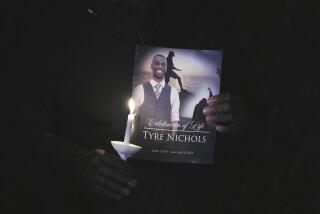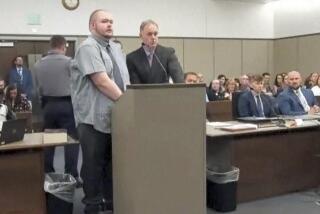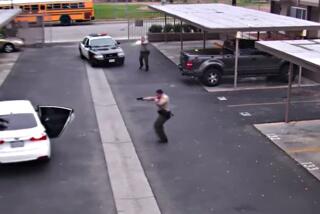Death penalty remains in Ft. Hood shooting case, judge rules
HOUSTON — A military judge Wednesday ruled that an Army psychiatrist charged in the deadly 2009 shooting at Ft. Hood in Texas would still face a possible death sentence at court-martial, potentially barring a guilty plea.
Maj. Nidal Malik Hasan, 42, is charged with 13 counts of premeditated murder and 32 counts of attempted murder in connection with the rampage at the Army base, the worst mass shooting on a U.S. military installation.
His lawyers had asked the judge, Col. Tara Osborn, to remove the death penalty in the case, setting the stage for a possible guilty plea. A guilty plea, however, is not allowed in military court if the defendant faces a possible death sentence.
Hasan’s lawyers probably requested the removal of the death penalty to create a record that could be used on appeal to reverse a conviction or reduce a death sentence to life in prison, said Geoffrey Corn, a retired lieutenant colonel and law professor at South Texas College of Law in Houston.
Corn said Hasan could still enter a partial plea, pleading guilty to the lesser offense of unpremeditated murder.
“If he does that, the trial changes radically,” Corn said, creating a challenge for military prosecutors and uncertainty for jurors, especially if Hasan takes the stand, expresses remorse and characterizes his guilty plea as a way of taking responsibility.
Military commanders gave prosecutors the right to seek the death penalty shortly after Hasan was charged. However, the top U.S. military appellate court ruled last month that the judge who had been presiding over the case, Col. Gregory Gross, had failed to remain impartial and ordered him removed.
Gross’ order that Hasan shave his beard or be forcibly shaved before trial was set aside after the judge’s removal. Hasan, a practicing Muslim, had tried to keep his beard based on religious grounds, appealing Gross’ order and delaying his trial.
Osborn, who was appointed to replace Gross, has yet to rule on the beard issue, although she hinted at a hearing last month that Hasan might be able to keep it during the trial, instructing his defense team to draft jury instructions that would address it.
Jeffrey Addicott, director of the Center for Terrorism Law at St. Mary’s University law school in San Antonio, said Osborn asserted herself with the latest ruling, and was likely to keep the case moving.
“That shows she’s not going to fall into the same trap as the previous judge and get distracted by collateral issues such as the beard,” he said.
Addicott predicted Hasan’s lawyers would probably appeal Osborn’s latest ruling.
“I hope the appellate court has the sense not to intervene and delay the case,” he said, adding that appellate courts usually didn’t get involved until after a court-martial, but that they had made an exception in the Hasan case.
Other issues expected to be addressed at next month’s hearing include whether there should be a change of venue and new jury selection, and under what circumstances prosecutors may present aggravating circumstances during presentencing proceedings.
Osborn is also set to reconsider the admissibility of testimony by Evan Kohlmann, a terrorism expert for the government, who had been challenged by Hasan’s lawyers but approved by Gross.
molly.hennessy-fiske@latimes.com
More to Read
Start your day right
Sign up for Essential California for news, features and recommendations from the L.A. Times and beyond in your inbox six days a week.
You may occasionally receive promotional content from the Los Angeles Times.







